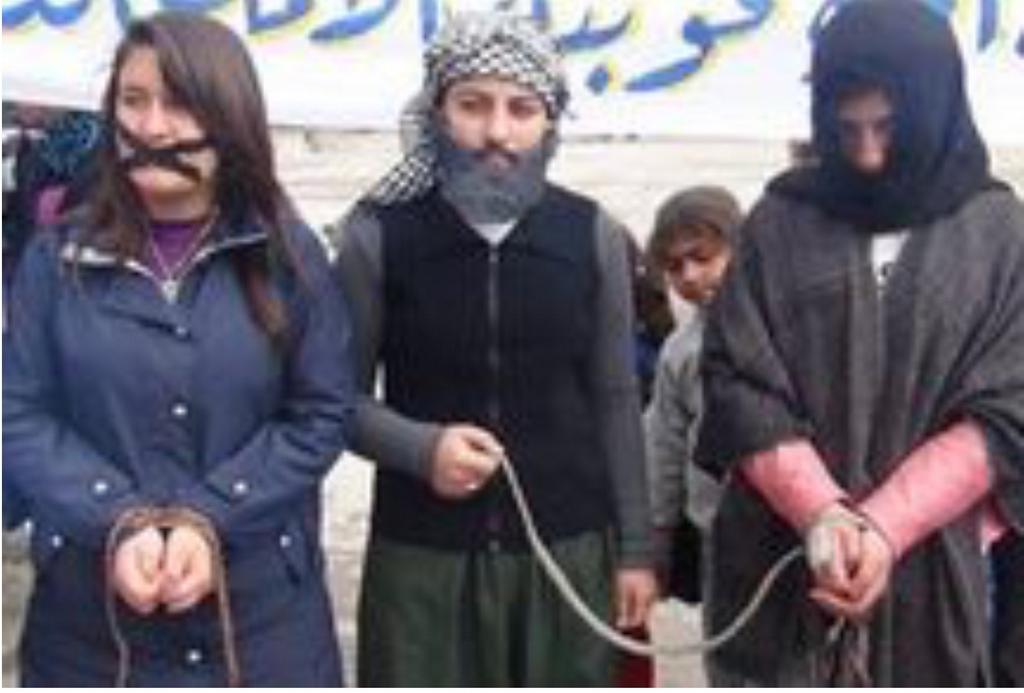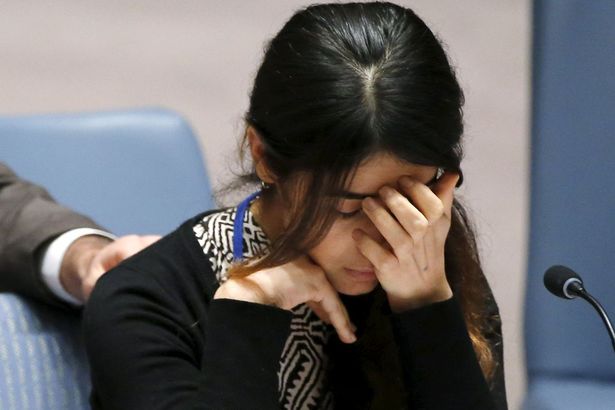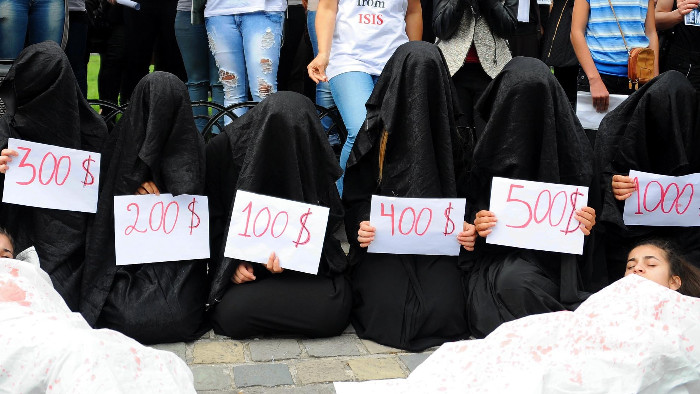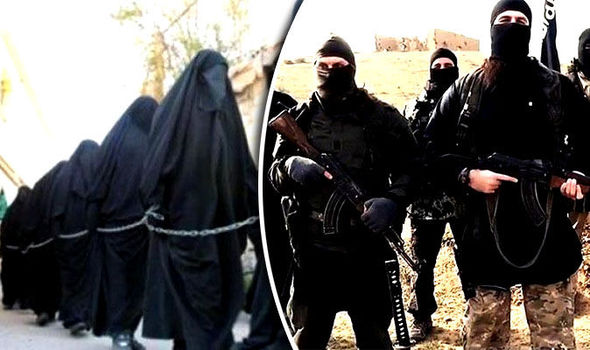As we know, among the Arabs in pre-Islamic times, burying girls alive was seen as a way for families to deliver themselves from what was believed to be the misfortune of having a female child.
It was only in a short period in the earliest age of Islam that through the teachings and practice of the Prophet and members of his virtuous household, women recovered, to a certain degree, their true worth and station.
With the revival and restoration of the former system, this time masquerading as the Islamic caliphate, women’s standing once again lapsed and gradually with the passage of time fossilised misinterpretations of Islam imposed crippling restrictions and limitations on women, such that even in the last few decades veins of these ossified views expressing disdain for women and belittling their position could still be clearly seen among the contemporary petrified religious traditionalists.
The story of woman’s rights and her liberty is one of the live and attractive issues being discussed over the last few years in the Eastern circles. Islamic countries are also faced with this debate, and different societies have different views in this regard, positive and/or negative.
Occasionally the matter extends beyond the limits of a debate and quietly enters the field of action making some special appearances in the Islamic environment. This issue of freedom and equality of rights is occasionally extended to such lengths; rightly or wrongly, that it reaches sensational limits, sometimes to the extent of being dangerous and repulsive.
Naturally in these discussions or actions, the name of Islam is also dragged in and various interpretations of the Islamic viewpoint are made in this regard. Some say that Islam is totally opposed to any liberty or progress for women and declare that Islam regards woman as a lowly weakling totally captive in the hands of man, deprived of all rights and social privileges.
She, according to them, has no right to property or dignity, not even in the selection of her husband and determination of her own destiny. She is deprived of the blessing of letters and is required to stay, with her eyes and ears closed, in the corner of her house, detached from society, to obediently perform every whim of her husband. She is condemned to live the life of a miserable creature that has no wider role to play in the human society. The life envisaged for her is the mean life of a helpless captive condemned to live and die without rights and without dignity. This is one type of thinking in regard to Islam’s view of women’s rights.
There is another group of extremists who feel that they can stretch Islamic laws in accordance  with their whims and fancies and make the sacred laws of Islam march in step with their own imagination at all cost. They feel that Islam has granted all sorts of rights and freedom to woman so as to permit her to intervene in all social spheres along with men, working shoulder to shoulder with him.
with their whims and fancies and make the sacred laws of Islam march in step with their own imagination at all cost. They feel that Islam has granted all sorts of rights and freedom to woman so as to permit her to intervene in all social spheres along with men, working shoulder to shoulder with him.
Under Wahhabism’s interpretation of Islam, women reverted to being objectified. Those many great women Islam saw rise under the strict protection of the Quran, those models Muslim women came to look up to and aspire to become – Ladies Maryam, Khadija, Fatma, Zaynab- Mohammed Abdel Wahhab would have had locked up in chains in their home.
When Islam gave women their rightful place within society, Wahhabism denied them everything.
In Saudi Arabia
In Saudi Arabia, as a Wahhabi government, women cannot drive a car, they are not allowed to eat in restaurant with their male family members. Woman should not work in a place where there is mixing with men, there are not allowed to travel alone. It is her duty to stay away from grouping with men and look for a job that is allowed by Islam, which does not expose her to lust if men lust after her it is haram (forbidden), and her employment by these companies is helping her commit a haram act. A woman’s prayers invalid if she is wearing jewelry while praying.
Women are second-class citizens in Saudi Arabia. Grand Wahhabi Mufti Abdulaziz underscored that notion when he declared, “Proponents of women’s emancipation are advocates of evil and misguidance.”
Women cannot vote and Saudis think these are Islamic laws. This is just a Wahabi prejudice against women.
In Pakistan
These harsh measures against women are seen in Pakistan too. In most family gatherings, men eat first, and if there is any food left, then female guests are allowed to eat. In Saudi Arabia and Pakistan, men decide for women what they should or should not wear.
In Afghanistan
In Afghanistan Mulla Mohammad Omar, who was the leader of the Wahhabi Taliban terrorist forces, established an assembly of the leaders of the Taliban, instituted the bigoted religious rulings of extremist Wahhabism and the ultimate law was executed only by his approval!
The Taliban, through the Kabul radio and loudspeakers fitted in trucks, announced their laws against women’s right to the citizens, Such as closed down girls’ schools and prohibited the employment of women outside the house, resulting in shortage of staff in hospitals. This was done when many of the women had lost their men in war and were financially destitute.
Mulla Omar opposed educating girls and women even in his own special schools, considered Haram (forbidden) the driving of women even with full Hijab (covering).
Sunni Saudi Wahhabi Cleric Issues Fatwa Allowing Jihadis to Rape Syrian Women and girls – and ask Egyptian singer to stop singing-Video

A Wahhabi religious cleric in Saudi Arabia, Muhammed al-Arifi, who is very influential in Jihadi circles, has recently issued a fatwa (religious edict) that permits all Jihadist militants in Syria to engage in short-lived marriages with Syrian women that each lasts for a few hours in order to satisfy their sexual desires and boost their determination in killing Syrians. He called the marriage as ‘intercourse marriage’. It requires that the Syrian female be at least 14 years old, widowed, or divorced. This is basically a fatwa to rape women and girls.
Saudi Wahhabi Cleric: OK to Kill Muslim Women & Children Unintentionally to Kill Infidels – video
A Saudi Wahhabi preacher who appeared on Saudi “al-Thaminah” TV stated that the killing of Muslim women and children is permissible according to his sources when it’s done as collateral damage resulting from the “lawful” aim of killing infidels. These Wahhabi preachers are the ones providing fatwas to combatants in Syria regarding what they view as religiously approved rules of war. Civilians in Syria have been indiscriminately targeted by Wahhabi terrorists supported by Saudi Arabia, all done under the justification of fighting an “infidel regime”.
On November 2014 Islamic State (ISIS) Releases Pamphlet on Female Slaves

One of the goals of Islam, as evidenced in both Qur’anic and prophetic practices about the merit of freeing slaves, was ultimately to end slavery at the time of revelation 1,400 years ago. This view has been universally adopted by Muslim societies and leaders. To revert to a practice that Islam sought to do away with makes a mockery of the principles of justice, equality, and other values and is merely a reflection of the gross misdeeds that are often perpetrated in war, including those against Muslim women in Bosnia and Syria. To do to others what was done to oneself is the antithesis of religion and morality.
Daesh sex slavery promoted by Saudi ideology as well as money and arms.
The Research and Fatwa Department of the Wahhabi terrorist group (ISIS) has released a pamphlet on the topic of female captives and slaves. The pamphlet, which is dated Muharram 1436 (October/November 2014) and was printed by ISIS’s publishing house, Al-Himma Library, is titled Su’al wa-Jawab fi al-Sabi wa-Riqab (“Questions and Answers on Taking Captives and Slaves”). It was presumably released in response to the uproar caused by the many reports this summer that ISIS had taken Yazidi girls and women as sex slaves.

Written in the form of questions and answers, it clarifies the position of Islamic law (as ISIS interprets it) on various relevant issues, and states, among other things, that it is permissible to have sexual intercourse with non-Muslim slaves, including young girls, and that it is also permitted to beat them and trade in them.
The following are excerpts from the pamphlet, which was posted on a pro-ISIS Twitter account:
“Question 1: What is al-sabi?
“Al-Sabi is a woman from among ahl al-harb [the people of war] who has been captured by Muslims.
“Question 2: What makes al-sabi permissible?
“What makes al-sabi permissible [i.e., what makes it permissible to take such a woman captive] is [her] unbelief. Unbelieving [women] who were captured and brought into the abode of Islam are permissible to us, after the imam distributes them [among us].”
“Question 3: Can all unbelieving women be taken captive?
“There is no dispute among the scholars that it is permissible to capture unbelieving women [who are characterized by] original unbelief [kufr asli], such as the kitabiyat [women from among the People of the Book, i.e. Jews and Christians] and polytheists. However, [the scholars] are disputed over [the issue of] capturing apostate women. The consensus leans towards forbidding it, though some people of knowledge think it permissible. We [ISIS] lean towards accepting the consensus…”
“Question 4: Is it permissible to have intercourse with a female captive?
“It is permissible to have sexual intercourse with the female captive. Allah the almighty said: ‘[Successful are the believers] who guard their chastity, except from their wives or (the captives and slaves) that their right hands possess, for then they are free from blame [Koran 23:5-6]’…”

“Question 5: Is it permissible to have intercourse with a female captive immediately after taking possession [of her]?
“If she is a virgin, he [her master] can have intercourse with her immediately after taking possession of her. However, is she isn’t, her uterus must be purified [first]…”
“Question 6: Is it permissible to sell a female captive?
“It is permissible to buy, sell, or give as a gift female captives and slaves, for they are merely property, which can be disposed of [as long as that doesn’t cause [the Muslim ummah] any harm or damage.”
“Question 7: Is it permissible to separate a mother from her children through [the act of] buying and selling?
“It is not permissible to separate a mother from her prepubescent children through buying, selling or giving away [a captive or slave]. [But] it is permissible to separate them if the children are grown and mature.”
“Question 8: If two or more [men] buy a female captive together, does she then become [sexually] permissible to each of them?
“It is forbidden to have intercourse with a female captive if [the master] does not own her exclusively. One who owns [a captive] in partnership [with others] may not have sexual intercourse with her until the other [owners] sell or give him [their share].”
“Question 9: If the female captive was impregnated by her owner, can he then sell her?
“He can’t sell her if she becomes the mother of a child…”
“Question 10: If a man dies, what is the law regarding the female captive he owned?
“Female captives are distributed as part of his estate, just as all [other parts] of his estate [are distributed]. However, they may only provide services, not intercourse, if a father or [one of the] sons has already had intercourse with them, or if several [people] inherit them in partnership.”
“Question 11: May a man have intercourse with the female slave of his wife?
“A man may not have intercourse with the female slave of his wife, because [the slave] is owned by someone else.”
“Question 12: May a man kiss the female slave of another, with the owner’s permission?
“A man may not kiss the female slave of another, for kissing [involves] pleasure, and pleasure is prohibited unless [the man] owns [the slave] exclusively.”
“Question 13: Is it permissible to have intercourse with a female slave who has not reached puberty?
“It is permissible to have intercourse with the female slave who hasn’t reached puberty if she is fit for intercourse; however if she is not fit for intercourse, then it is enough to enjoy her without intercourse.”
“Question 14: What private parts of the female slave’s body must be concealed during prayer?
“Her private body parts [that must be concealed] during prayer are the same as those [that must be concealed] outside [prayer], and they [include] everything besides the head, neck, hands and feet.”
“Question 15: May a female slave meet foreign men without wearing a hijab?
“A female slave is allowed to expose her head, neck, hands, and feet in front of foreign men if fitna [enticement] can be avoided. However, if fitna is present, or of there is fear that it will occur, then it [i.e. exposing these body parts becomes] forbidden.”
“Question 16: Can two sisters be taken together while taking slaves?
“It is permissible to have two sisters, a female slave and her aunt [her father’s sister], or a female slave and her aunt [from her mother’s side]. But they cannot be together during intercourse, [and] whoever has intercourse with one of them cannot have intercourse with the other, due to the general [consensus] over the prohibition of this.”

“Question 17: What is al-‘azl?
“Al-‘azl is refraining from ejaculating on a woman’s pudendum [i.e. coitus interruptus].”
“Question 18: May a man use the al-‘azl [technique] with his female slave?
“A man is allowed [to use] al-‘azl during intercourse with his female slave with or without her consent.”
“Question 19: Is it permissible to beat a female slave?
“It is permissible to beat the female slave as a [form of] darb ta’deeb [disciplinary beating], [but] it is forbidden to [use] darb al-takseer [literally, breaking beating], [darb] al-tashaffi [beating for the purpose of achieving gratification], or [darb] al-ta’dheeb [torture beating]. Further, it is forbidden to hit the face.”
Question 20: What is the ruling regarding a female slave who runs away from her master?
“A male or female slave’s running away [from their master] is among the gravest of sins…”
“Question 21: What is the earthly punishment of a female slave who runs away from her master?
“She [i.e. the female slave who runs away from her master] has no punishment according to the shari’a of Allah; however, she is [to be] reprimanded [in such a way that] deters others like her from escaping.”
“Question 22: Is it permissible to marry a Muslim [slave] or a kitabiyya [i.e. Jewish or Christian] female slave?
“It is impermissible for a free [man] to marry Muslim or kitabiyat female slaves, except for those [men] who feared to [commit] a sin, that is, the sin of fornication…”
Question23: if a female slave is married (to her master), then does she also have a right to a turn that he spends the night with her (the way a free woman has a right to a turn)?
“There is no (obligation) upon a man in dividing (his nights) amongst those whom his right hand possess… However if she (the slave woman) is in need of marriage then it is his duty to see to her purity, either by having intercourse with her or marrying her, otherwise selling her.”
“Question 24: If a man marries a female slave who is owned by someone else, who is allowed to have intercourse with her?
“A master is prohibited from having intercourse with his female slave who is married to someone else; instead, the master receives her service, [while] the husband [gets to] enjoy her [sexually].”
“Question 25: Are the huddoud [Koranic punishments] applied to female slaves?
“If a female slave committed what necessitated the enforcement of a hadd [on her], a hadd [is then] enforced on her – however, the hadd is reduced by half within the hudud that accepts reduction by half…”
“Question 27: What is the reward for freeing a slave girl?
“Allah the exalted said [in the Koran]: ‘And what can make you know what is [breaking through] the difficult pass [hell]? It is the freeing of a slave.’ And [the prophet Muhammad] said: ‘Whoever frees a believer Allah frees every organ of his body from hellfire.'”
Q31: what is the expiation for having intercourse with one’s wife or slave during the day in Ramadhaan?
Its expiation is freeing a slave, whoever is not able to do so should fast two consecutive months, and whoever is unable to do that should feed sixty poor people, in that order.
(Hadhrat) Abu Hurayrah Radhiallaahu `Anhu reports: “A man slept with his wife during Ramadhaan, so he sought a verdict from Rasoolullaah Sallallaahu `Alayhi Wa Sallam regarding that, so he (Sallallaahu `Alayhi Wa Sallam) asked him: “Do you have a slave?” He replied: “No.” Be (Sallallaahu `Alayhi Wa Sallam) asked him: “Are you able to fast two consecutive months?” He replied: “No.” He (Sallallaahu `Alayhi Wa Sallam) told him: “Then feed sixty poor people.” – Agreed upon by Bukhaari and Muslim.
Question32: is it a condition in the freeing of a slave that the slave should be a believer?
The jurists are unanimous that it is a condition in the freeing of a slave due to the expiation for killing someone that the slave must be a believer, but they differed regarding the expiation for an oath, for Azh-Zhihaar and for having intercourse during the day in the Ramadhaan.
********************
For those of you who continue to live under the premise that Islam is profoundly unfair against women, do remember it is not Islam but rather men’s interpretation of it which is the source of your ire.
Islam secured women’ status according to God’s will. Islam poses both men and women on equal footing in terms of their faith – it is only in their duties and responsibilities which they differ, not worthiness. Islam calls on men to provide for women and offer them security, both financial and physical. Under Islam women are free to marry, divorce and work. Under Islam women cannot be bought, bartered or oppressed. Under Islam women enjoy more freedom than most western women have been given. Under Islam Women are not of secondary importance and are not servants as Ayatollh Khamenei said. It is society which has denied them those rights, not Islam. Read the Quran and you will see!
The following are some Videos of other ridiculous fatwas issued by Wahhabi Clerics:
Girls Should Wear the Hijab from the Age of Two;
Sex with Pregnant Wife Enhances Future Child’s Intelligence;
Husbands May Have Sex with Dead Wife’s Corpse; Women May Use Carrots as Vibrators
 Ijtihad Network Being Wise and Faithful Muslim in the Contemporary World
Ijtihad Network Being Wise and Faithful Muslim in the Contemporary World


This discussion on women’s rights shows how cultural misinterpretations overshadowed the true spirit of Islam, which actually uplifted and honored women. Reflecting on surah kahf in roman english reminds us that real guidance lies in the Qur’an — protecting justice, dignity, and equality for all, including women, as part of divine wisdom.